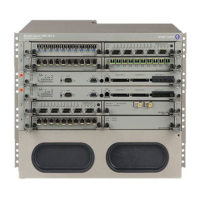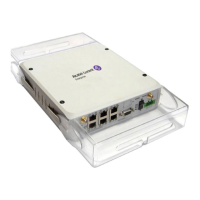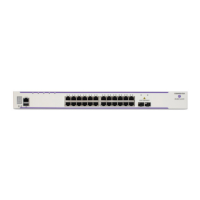Circuit Emulation VLL (Cpipe) Services
Page 156 7705 SAR OS Services Guide
Control Word
The structure of the control word is mandatory for SAToP and CESoPSN and is shown in
Figure 24. Table 21 describes the bit fields. Refer to Pseudowire Control Word on page 190
for more information.
Figure 24: Control Word Bit Structure
0 1 2 3
0 1 2 3 4 5 6 7 8 9 0 1 2 3 4 5 6 7 8 9 0 1 2 3 4 5 6 7 8 9 0 1
+-+-+-+-+-+-+-+-+-+-+-+-+-+-+-+-+-+-+-+-+-+-+-+-+-+-+-+-+-+-+-+-+
|0|0|0|0|L|R| M |FRG| LEN | Sequence number |
+-+-+-+-+-+-+-+-+-+-+-+-+-+-+-+-+-+-+-+-+-+-+-+-+-+-+-+-+-+-+-+-+
Table 21: Control Word Bit Descriptions
Bit(s) Description
Bits 0 to 3 The use of bits 0 to 3 is described in RFC 4385. These bits are set
to 0 unless they are being used to indicate the start of an
Associated Channel Header (ACH) for the purposes of VCCV.
L
(Local TDM Failure)
The L bit is set to 1 if an abnormal condition of the attachment
circuit such as LOS, LOF, or AIS has been detected and the
TDM data carried in the payload is invalid. The L bit is cleared
(set back to 0) when fault is rectified.
R
(Remote Loss of
Frames indication)
The R bit is set to 1 if the local CE-bound interworking function
(IWF) is in the packet loss state and cleared (reset to 0) after the
local CE-bound IWF is no longer in the packet loss state.

